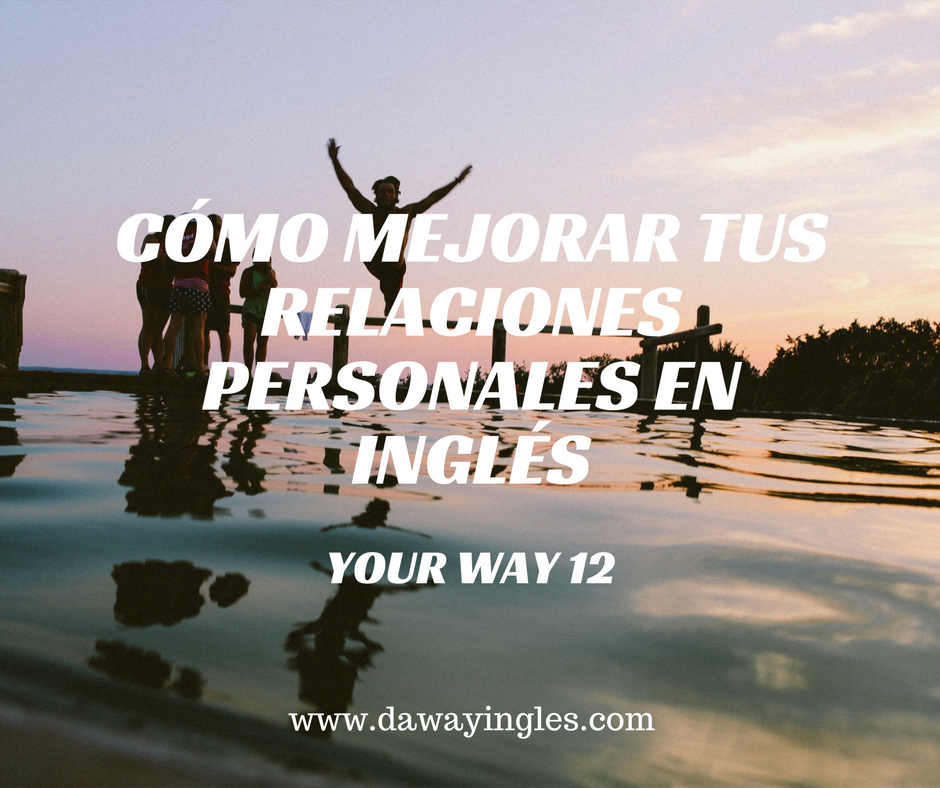¿Te gustaría mejorar tus relaciones personales en inglés? ¿Conectar mejor con la gente? Do you want to really enjoy your social interactions? Then, this podcast is for you!
Welcome to Your Way, once again!
How’s things? Ready to put English into real world practice? In today’s episode, number 12, we will try to answer a question from Iñaki, who lives in Guipúzcoa.
Iñaki filled in the survey we always send to our readers (at the end of this post) and asked us about social skills and personal relationships. Nos pregunta por habilidades sociales y relaciones personales en inglés. Hemos aprovechado el podcast para contestarle y ofrecerte un montón de inglés práctico que puedes aprender y usar hoy mismo!
I love this topic, really. I used to be a complete introvert and little by little, I have changed (and will continue to do so!). Disfrutar de la gente, de conocer nuevas personas, de ayudar, de escuchar y compartir momentos…tus habilidades sociales sean, posiblemente, la mejor inversión que harás jamás. Social skills are far more important than knowledge, intelligence, money…Pueden salvarte en cientos de situaciones y, dado que somos seres sociales por naturaleza, harán que mejores tu calidad de vida x 1000 🙂
Both Mónica and I try our best to discuss this topic, keeping it cool and chilled, as usual, just chatting about it. Nos propusimos simplemente charlar del tema y contarle a Iñaki nuestras respectivas experiencias con la gente. ¿El resultado? Un podcast de muy buen rollo, con un montón de inglés práctico para que vayas apuntando y momentos interesantes. We had such a good time!
Let’s do this!
Cómo mejorar tus relaciones personales en inglés – Your Way 12
Usa este enlace para descargar el podcast en formato mp3
Ideas mentioned in this podcast
– Question of the day (from Iñaki, in Guipúzcoa): how to improve your social skills and personal relationships (for networking, friendship, etc) – 0:34
– Tip 01: give before asking, focus on giving instead of receiving. Don’t be afraid to put the other person’s interest before yours, don’t think of “getting something in return” – 01:13
– Tip 02: be humble. Respect and value everyone and try to destroy your ego, don’t divide people in groups (what I like, what I don’t like, good or bad, better or worse, etc) – 05:05
– Why it is so important to travel and live experiences and get to know other cultures, to have information about very different things or perspectives – 09:37
– Tip 03: even though you need to be open-minded, it is natural to be defensive when meeting people from other communities/cultures/groups. This is part of nature – 10:49
– How making friends from other countries (travelling abroad or in your city, using tandems, etc) can be the most beautiful thing you will ever do in your life – 16:00
– Not everyone has to be extremely outgoing and that’s fine, of course. Some people live more happily being introvert – 17:00
– Why you need to change the ideas of how you see the world to destroy or change some common misconceptions: every country has the same types of people, no matter where you go, nothing is either A or B, better or worse in practical terms – 20:15
– Tip 04: don’t try to be liked by everyone and don’t try to like everyone either – 26:45
– Tip 05: try not to value people based on their external skills (or whether those skills are things that you admire or not). Everyone is special and has something to offer – 28:52
– You learn the most from people who don’t align with your values or who don’t like you. That feedback is priceless. Mónica’s cat is in da house and some stories about the time when she was working at an office – 31:45
– Tip 06: Try to practise active listening, it’s a skill you can work on and improve if you are committed and make it a habit – 38:24
Vocabulary used in this episode
– A volunteer: un voluntario/a
– To show up: aparecer, presentarse en un sitio
– To give something in return: dar algo a cambio
– Word of mouth: el boca a boca
– Authentic: auténtico/a
– Legacy: legado
– Humble: humilde
– To brag (about something): fardar de algo
– Annoying: molesto, pesado
– A sin: un pecado
– Pride: orgullo
– To be a people person: ser una persona de gentes, que se le dan bien las personas
– To have an ego: tener ego
– Features: rasgos (físicos)
– Traits: rasgos (personalidad, capacidades, etc)
– Nazi: nazi
– An immigrant: un/a inmigrante
– To discriminate: discriminar
– An advantage / a disadvantage: una ventaja / una desventaja
– A tribe: una tribu
– To belong to a place/group: pertener a un sitio/grupo
– A dress code: código de vestimenta
– A memory: un recuerdo
– B&B: bed and breakfast (un tipo de hotel/hospedaje barato)
– To be reluctant to do something: estar o ser reacio a hacer algo
– I can’t help it: no puedo evitarlo
– A person’s background: el trasfondo o pasado de una persona
– To shape something: darle forma a algo
– To be outgoing / introvert: ser abierto/introvertido/a
– Genetic: genético
– To point at something: señalar a algo o alguien
– To be isolated: estar aislado/a
– Up to a point: hasta cierto punto
– Childhood: infancia
– A misconception: una idea equivocada o confusión
– Nationalism: nacionalismo
– The Basque Country: el país vasco
– A species: una especie
– There’s always someone South // The pot calling the kettle black: siempre hay alguien en tu misma situación, le pasa a todo el mundo y a todos los niveles // le dijo la sartén al cazo
– To look down on people: mirar por encima del hombro a alguien
– A human being: un ser humano
– Values: valores
– Politeness: educación, respeto
– A conflict: un conflicto
– To get along with a person: llevarte bien con alguien
– Bullshit: tonterías
– Skillful: habilidoso/a, capaz
– A witch: una bruja (personaje ficcional) / bruja o arpía (femme fatale)
– To have an affair with someone: tener un affair o lío amoroso/rollo con alguien
– To stand someone/something: aguantar a alguien/algo
– A buoy: una boya (mar)

